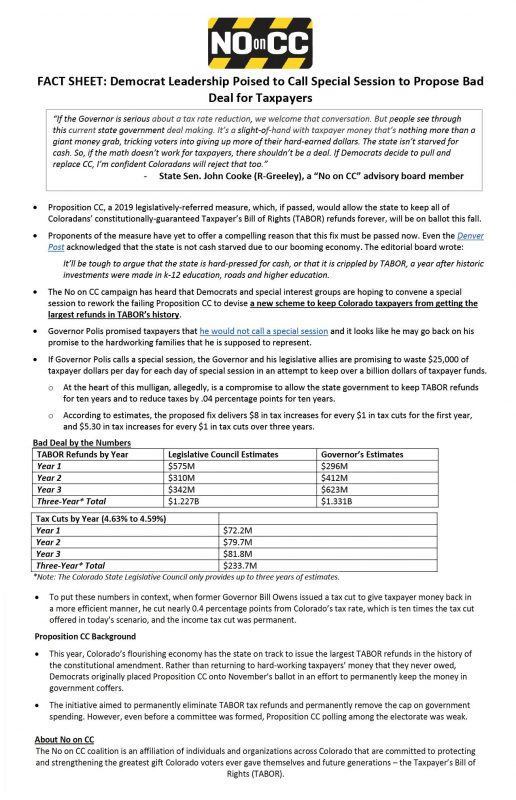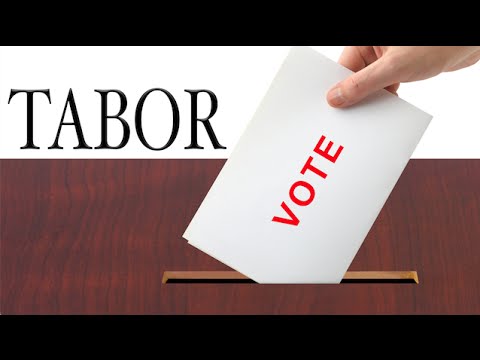FACT SHEET: Democrat Leadership Poised to Call Special Session to Propose Bad Deal for Taxpayers #NoOnPropCC #copolitics #coleg

FACT SHEET: Democrat Leadership Poised to Call Special Session to Propose Bad Deal for Taxpayers #NoOnPropCC #copolitics #coleg

Don’t mess with TABOR.
TABOR protects you from Tax & Spend politicians.
Vote NO on Proposition CC in November and NO on repealing TABOR in November 2020.
Don’t lose your rights!
The network is called Vision 2020, and so far it includes the Bell Policy Center and Colorado Fiscal Institute, and Great Education Colorado, among others.
The network recently praised a Colorado Supreme Court ruling that said a proposed measure to repeal TABOR outright doesn’t violate the state constitution’s single-subject requirement. The ruling means TABOR, passed by voters in 1992, could be repealed with one vote.
Proponents of repeal would still need to collect signatures to get the question on the ballot for 2020.


In this file photo, volunteers pile up signs for backers of the 2005 ballot measures that aimed to lift some TABOR restrictions. Referendum C passed which allowed the state to retain expected refunds for five years and reset the TABOR base.
By JON CALDARA | Columnist for The Denver Post
PUBLISHED: June 28, 2019 at 2:14 pm
Come on you taxpayer-hating, consent-loathing, voter-fearing pantywaists.
Cowboy up and put a full repeal of our Taxpayer’s Bill of Rights on the ballot. You know you want to. So just do it.
I’m talking to you in the Colorado Legislature who’ve been calling tax increases “fees” because you don’t trust the people who elected you to vote on their own taxes. You who want another “TABOR time out” to nibble away consent and jack up spending limits permanently.
You’ve always hated TABOR because you hate asking for permission to raise taxes. You hate asking to raise debt. You hate asking to keep excess tax revenue above the rate of population growth and inflation.
You’ve used every conceivable loophole the courts have pried open for you to keep what would have been refunded to working families.
And now you never want to have to ask again.

Jun 25, 2019

The Ralph L. Carr Colorado Judicial Center in downtown Denver is the home of the Colorado Supreme Court, the state Court of Appeals and the office of the state attorney general.
(istock/getty images)
The National Federation of Independent Business said its state Supreme Court case has exposed licensing fees for what they are: Taxes.
And as taxes, they should be covered by the state constitutional Taxpayer’s Bill of Rights, meaning the government can’t raise them without a vote of the people.
A ballot measure in November will ask voters a key question, and now lawmakers are talking about a special legislative session, too

We’ve always thought a repeal of the Taxpayer’s Bill of Rights would be prudent. We now know, thanks to a Colorado Supreme Court ruling, that it’s possible; all that remains to be known is if it’s plausible.
Common lore and a dismal record of voter approval for tax increases would indicate that voters in fact like TABOR. When asked to raise taxes, as required under TABOR, voters have said no, consistently.
This summer, the conversation is going to heat up around TABOR, especially given that taxpayer refunds are in the forecast. We have some advice for how opponents of the rigid and restrictive amendment should frame the conversation.
First, we are no longer convinced that the state needs more revenue for the general fund. The state’s economy is booming, and thanks to the Tax Cuts and Jobs Act, revenue from state income tax filings has spiked in Colorado.
How much more revenue are we talking about?
To read of the rest of the Denver Post Editorial, click (HERE):
COLORADO SPRINGS, Colo. – An effort to abolish TABOR, Colorado’s Taxpayer’s Bill of Rights, is moving forward. The Colorado State Supreme Court has ruled a repeal question can be put before voters in 2020 if enough signatures are gathered.
In a few short words, the man who wrote the law and got it passed back in 1992 said, “when that happens, which it won’t, call me.”
When asked what would happen if it did happen, Doug Bruce, former Colorado lawmaker responded, “You’re asking me to speculate on a proposal that’s never going to happen.”
Click (HERE) to read the rest of the story and see the video.
Coloradans are inching closer to their first TABOR tax refunds in years, according to updated state revenue forecasts released Wednesday.
In fact, state collections have been so strong that taxpayers are likely to get both a sales tax refund and a state income tax cut, according to Kate Watkins, the chief economist for Colorado’s Legislative Council.
She and her team estimate TABOR will drop the state’s income tax rate from 4.63 percent to 4.5 percent for both 2019 and 2020. For someone who makes $50,000 a year that’s a savings of $65. The sales tax refund amount is based on a complicated formula, but it ranged from $13 to $41 when the state last gave them out, in 2015.